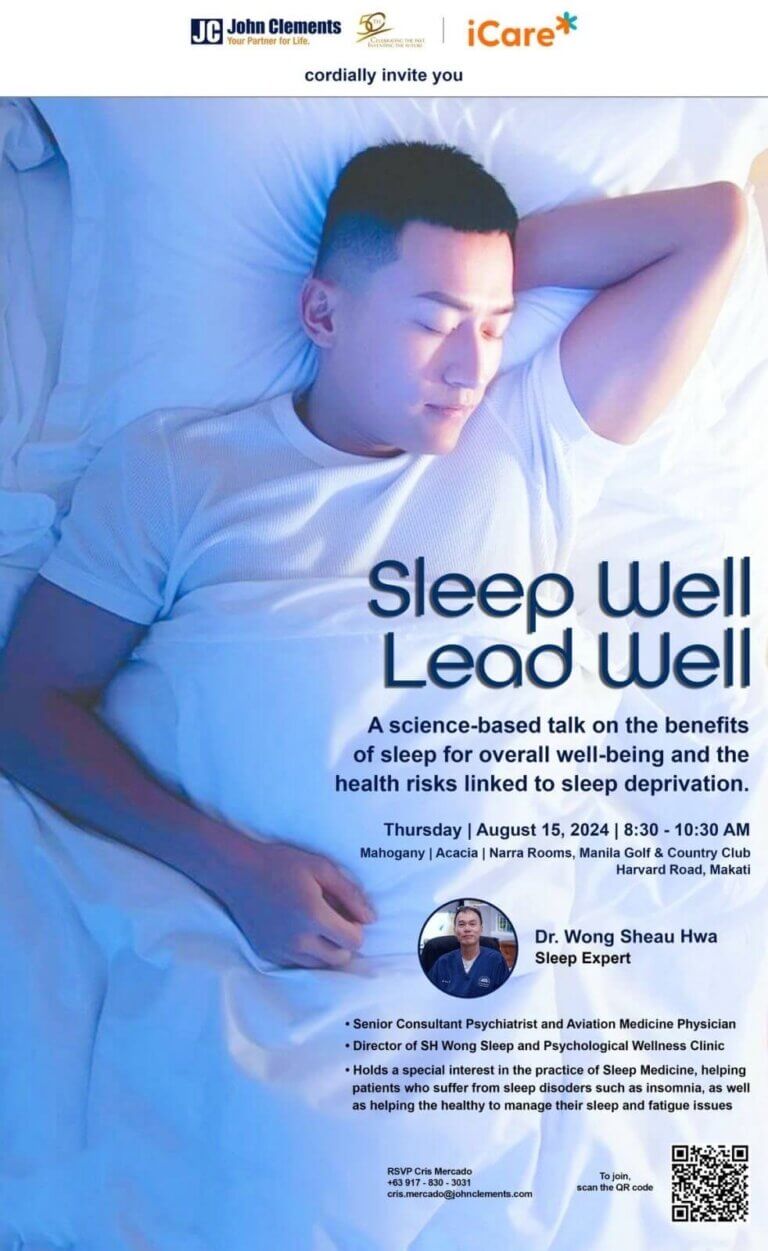On August 15, 2024, a breakfast session titled “Sleep Well, Lead Well” was held at the Manila Golf Club in Makati, co-organized by Insular Healthcare (iCare) and John Clements Consultants. The session focused on the importance of sleep for leaders and overall well-being, featuring insights from Dr. Wong Sheau Hwa, a respected sleep expert.


The Pervasiveness of Insomnia
Insomnia is a common issue that many individuals face, yet its impact is often underestimated. Dr. Wong emphasized that sleep deprivation does not just lead to tiredness; it can cause impulsiveness, irritability, memory difficulties, and low energy levels. Chronic sleep deprivation is even linked to serious conditions such as depression. The message was clear: good sleep is essential for mental and physical health.

Understanding Sleep Cycles
Sleep is composed of four to five cycles per night, each playing a critical role in our health. On average, deep sleep accounts for about 120 minutes (about 2 hours) and primarily occurs during the first half of the night. This stage is crucial for physical repair, while the second half of sleep focuses on processing and consolidating memories from the day. Dr. Wong explained that waking up too early can disrupt this process, depriving the brain of its vital dream phase, which is essential for emotional and cognitive balance.
Caution with Sleep Aids and Naps
For those struggling with insomnia, Dr. Wong advised against the routine use of sleeping pills, highlighting that they are not a long-term solution. Instead, he recommended focusing on natural sleep hygiene practices and maintaining a healthy sleep routine.
Dr. Wong also spoke about the benefits and limitations of power naps. While a 30-minute nap can refresh the mind, longer naps may lead to sleep inertia, leaving one feeling groggy rather than rejuvenated.
Lifestyle Choices Affect Sleep Quality
Several lifestyle factors can significantly impact sleep quality. For instance, nicotine is a stimulant and should be avoided close to bedtime as it can make falling asleep more difficult. Similarly, eating large meals late at night can hinder the body’s ability to rest, leading to sleep disruptions.
Most people typically fall asleep within 20-30 minutes of going to bed. Dr. Wong suggested that if sleep does not come naturally within this timeframe, it is better to get up and engage in a calming activity rather than staying in bed and becoming stressed about not sleeping.
The Critical Role of Breathing in Sleep
Proper breathing during sleep is essential. Obstructed breathing, often caused by conditions like sleep apnea, can have severe consequences. When breathing is restricted, oxygen levels drop, leading to snoring and other health complications. Dr. Wong warned that untreated sleep apnea could have serious long-term effects on overall health.

Tips for Better Sleep Hygiene
Dr. Wong concluded the session with practical tips for improving sleep hygiene:
- Fixed Routine: Establish a regular sleep schedule to help regulate your body’s internal clock.
- Comfortable Sleepwear: Wear comfortable clothing that does not restrict movement.
- Avoid Bright Light: Minimize exposure to bright light before bed to support your natural sleep-wake cycle.
- Conducive Environment: Create a sleep-friendly environment that is dark, quiet, and cool.
- Refrain from Stimulants: Avoid caffeine and nicotine close to bedtime.
- Healthy Lifestyle: Maintain a balanced diet and engage in regular physical activity.
- Stimulus Control: Reserve your bed for sleep and relaxation to strengthen the association between bed and sleep.
- Soothing Activities: Listen to calming music or watch a relaxing movie to ease into sleep.
- Slow, Relaxing Activities: Engage in calming activities, such as reading a book, to naturally induce sleepiness.


The key takeaway from the “Sleep Well, Lead Well” session was that sleep is not just a luxury but a necessity. For leaders and individuals alike, prioritizing sleep is crucial for maintaining health, productivity, and overall quality of life. By adopting the sleep hygiene practices shared by Dr. Wong, individuals can improve their sleep patterns, leading to better mental, emotional, and physical well-being. Effective leadership begins with a well-rested mind.
Unlock new opportunities! Explore our events page to discover upcoming workshops and events designed to elevate your skills and connections.





